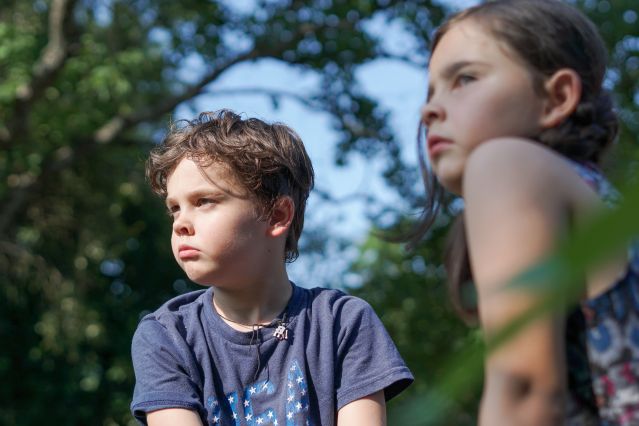Gratitude
5 Ways to Teach Your Child to Be Grateful
Expressing gratitude is a skill all children need to learn.
Posted December 22, 2022 Reviewed by Lybi Ma
Key points
- Kids don’t necessarily see adult effort, so they may not realize when they should express gratitude.
- Modeling alone won’t necessarily lead kids to express thanks. They need to understand when and why.
- Thank-you notes offer children practice in expressing gratitude. They tell the giver their efforts are valued.

Q: My kids are good kids, but sometimes they’re ungrateful. Often, when another family member or I do something special for them, they don’t say thank you. What can I do to help them be genuinely grateful?
There’s a lot of research showing that gratitude in adults makes us feel happier. However, through many years of insisting that my children write thank-you notes, I never saw that fill them with joy. But I still think it’s important to teach kids the importance of saying “Thank you.”
Kids don’t necessarily see the adult effort. You know the thought, time, and energy that went into doing something special for them, but from a child’s perspective, adults are always doing things they can’t do to take care of them. They may not realize when something was a special effort.
Because their perspective-taking skills are still developing, kids also may not recognize when it’s important to say thank you, why it matters, and the impact on relationships if they don’t.
Here are some ideas to help your child learn the essential skill of expressing gratitude:
1) Help your child figure out why expressing gratitude matters
Ask your child, “Why do you think it’s important to say thanks to someone who does something kind for you? How will they feel if you don’t?” Appreciation is free and priceless. Can your kids explain why?
Thinking things through with kids and imagining others’ perspectives is more effective in helping them own the grateful behavior than the usual “What do you say?” followed by a begrudging “Thanks.”
2) Model gratitude
Let your child see you thanking others, including them. “Thank you. That was a big help." Hearing a thank you lets them experience what it’s like to be on the receiving end of gratitude. Watching you make the effort to thank friends and family members helps them learn how to do it. It also lets them see that expressing gratitude is a common and important part of relationships.
3) Prompt gratitude
Modeling alone won’t necessarily lead kids to express thanks. Without prompting, they could view it as something you do, not something they need to do.
With family members, if possible, try to do the prompting before seeing the relative. You could say, “Grandpa is making a special dinner for you because she knows you like it. What can you do to show her you’re grateful for her effort?”
If you can’t prompt the thanks ahead of time, you can still comment about the giver’s behavior in the moment. “Wow, Grandma must have spent a lot of time making this special dinner.” Perhaps coupled with a pointed look, this could help your child see the effort and prompt a genuine thank you.
4) Make thank-you notes a habit
It’s old-fashioned, but I still love thank-you notes. I think it’s worth insisting that our kids write them, when appropriate. Thank-you notes offer children practice in expressing gratitude. They tell the giver their efforts are valued. Young children could draw a picture and maybe copy the words “Thank you.” Older kids could send a written note or an email.
A formula for a good thank you note:
- Acknowledge the gift or effort. “Thank you so much for taking me apple picking.”
- Mention the giver’s generosity. “It was so kind of you to plan this fun event and spend the day with me.”
- Describe a special part or positive impact of the gift or effort. “I especially like getting to ride in the wagon and making baked apples with you. They were delicious.”
5) Use humor as a gentle reminder to express gratitude
Silliness can be a great way to get through to kids. When my kids were younger, and I did something wonderful for them, I would thank myself the way I’d like to be thanked: “Thank you, sweet Mommy. What a thoughtful thing to do. Every day, in so many ways, you do such kind and generous things. It’s nothing less than inspiring.” I added energetic arm movements, clasping my hands to my heart, and gesturing expansively with one or both arms.
I could go on like this for a good ten minutes, and I’m sure you could, too. Sometimes, I would do a similar speech starting with “Thank you, sweet Daddy.” Eventually, (to stop me?) the kids said “Thank you, sweet Mommy,” and I’d say, “You’re welcome.”
Did it help my kids develop genuine gratitude? I don’t know, but it made me feel better. My kids are adults now, and they do sometimes spontaneously say, “Thank you, sweet Mommy.”
Beware of resentment
One final note on the topic of gratitude: resentment is poison in any relationship. If you’re feeling a lot of resentment, think carefully about what is leading to this and how you might be able to shift things. Could you do it differently or less? Could someone else help? Could the kids do it themselves (perhaps with some coaching, first)?
Ask yourself, are you just looking for some appreciation or do you need to dial back what you do? If you can’t do whatever it is with an open heart, it might be better, if possible, not to do it.
Copyright Eileen Kennedy-Moore, Ph.D.




